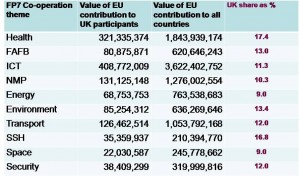 Free movement of lawyers: proposals should evaluate the legal framework for the free movement of lawyers against market and regulatory developments in the single market. Funding is worth up to €500,000 over 11 months. Deadline 15.09.11
Free movement of lawyers: proposals should evaluate the legal framework for the free movement of lawyers against market and regulatory developments in the single market. Funding is worth up to €500,000 over 11 months. Deadline 15.09.11
Socio-economic impacts of new measures to improve accessibility of goods and services for people with disabilities: proposals should explore the merits of adopting EU regulatory measures to substantially improve the proper functioning of the internal market for accessible products and services, including measures to step up the use of public procurement. Funding is worth up to €800,000 over 12 months. Deadline: 22.08.11
Roma in education: this funding supports transnational cooperation projects in the development and implementation of coherent and comprehensive joined-up educational measures to raise the participation and attainment levels of Roma students in general education and vocational educational training, and to support network activities for awareness-raising of the social integration of Roma children and students. The total budget for the call is €584,000 and each grant is worth up to €150,000 over a maximum of 12 months. Deadline: 16.09.11
European policy network on the education of children and young people with a migrant background: this funding supports cross-European collaboration between high level decision makers, academics and practitioners for raising the educational attainment of children and young people from a migrant background. The maximum duration of projects is 36 months, and a total budget of €500,000 is available for 2012. Deadline 14.10.11
Support for the Digitisation of European Cinemas: the aim of the ‘digitisation of cinemas’ scheme is to encourage cinemas showing a significant percentage of non-national European works to exploit the possibilities offered by digital. This call for proposals aims to facilitate the digital transition of cinemas screening European films by supporting the side costs linked to the purchase of a digital projector. Closing date: 15 September 2011
e-Skills for Competitiveness and Innovation: the aim of this fund is to develop, with relevant stakeholders, a coherent vision and a detailed roadmap as well as foresight scenarios on the supply and demand of e-skills for competitiveness and innovation in Europe (2011–2015). It will build on the momentum of the EU e-skills strategy. The skills needed include ICT, marketing, design, law, management, etc. for entrepreneurs, managers and ICT professionals and advanced users in all industries. Closing date: 16 September 2011
 Quantifying public procurement of research and development of ICT solutions in Europe: proposals should gather quantitative evidence of research and development and ICT products and services procured by public contracting authorities across EU member states and associated countries, and cluster the data on a map to show the main fields of public interest in which procurement expenditures occur. Funding is worth up to €400,000 over 24 months. Deadline 23.09.11
Quantifying public procurement of research and development of ICT solutions in Europe: proposals should gather quantitative evidence of research and development and ICT products and services procured by public contracting authorities across EU member states and associated countries, and cluster the data on a map to show the main fields of public interest in which procurement expenditures occur. Funding is worth up to €400,000 over 24 months. Deadline 23.09.11


























 Nursing Research REF Impact in Nepal
Nursing Research REF Impact in Nepal Fourth INRC Symposium: From Clinical Applications to Neuro-Inspired Computation
Fourth INRC Symposium: From Clinical Applications to Neuro-Inspired Computation ESRC Festival of Social Science 2025 – Reflecting back and looking ahead to 2026
ESRC Festival of Social Science 2025 – Reflecting back and looking ahead to 2026 3C Event: Research Culture, Community & Cookies – Tuesday 13 January 10-11am
3C Event: Research Culture, Community & Cookies – Tuesday 13 January 10-11am Dr. Chloe Casey on Sky News
Dr. Chloe Casey on Sky News ECR Funding Open Call: Research Culture & Community Grant – Application Deadline Friday 12 December
ECR Funding Open Call: Research Culture & Community Grant – Application Deadline Friday 12 December MSCA Postdoctoral Fellowships 2025 Call
MSCA Postdoctoral Fellowships 2025 Call ERC Advanced Grant 2025 Webinar
ERC Advanced Grant 2025 Webinar Horizon Europe Work Programme 2025 Published
Horizon Europe Work Programme 2025 Published Update on UKRO services
Update on UKRO services European research project exploring use of ‘virtual twins’ to better manage metabolic associated fatty liver disease
European research project exploring use of ‘virtual twins’ to better manage metabolic associated fatty liver disease